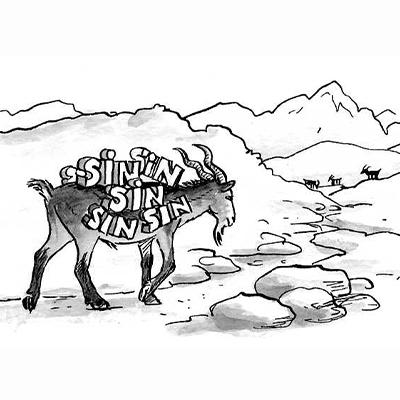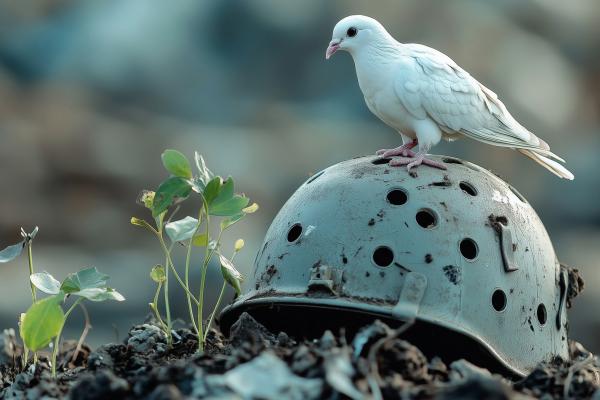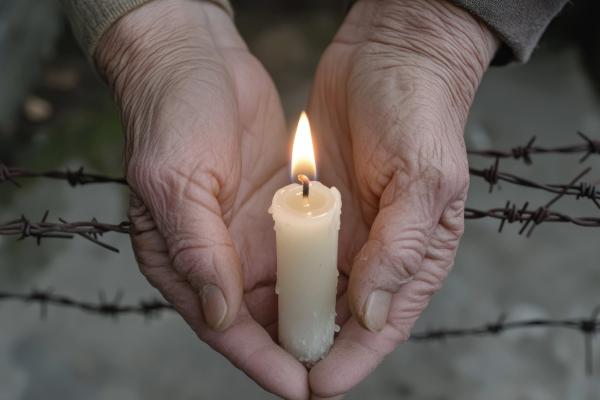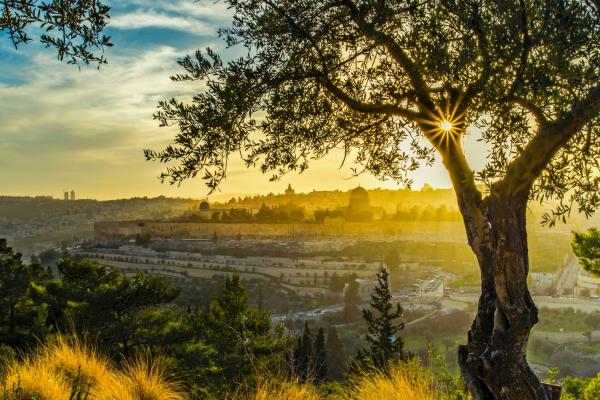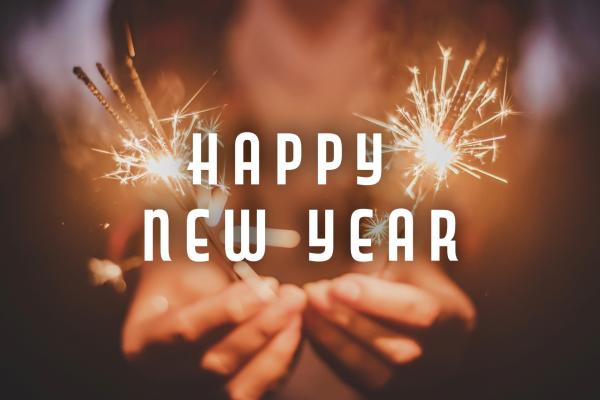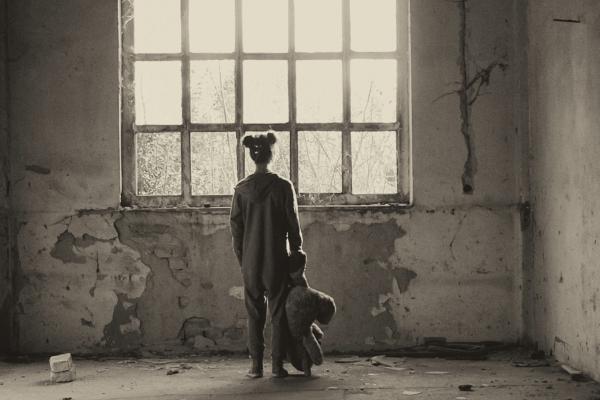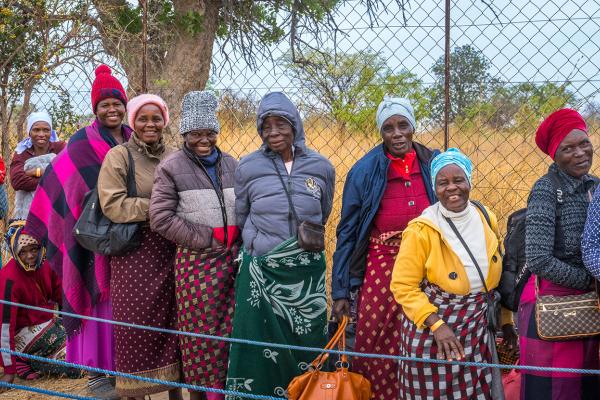The air around the tabernacle is thick today.
It is Yom Kippur, the annual Day of Atonement, when the Almighty and Holy God covers our sin.
We haven’t eaten anything. God commanded that we afflict our souls, so we fast. He also commanded a complete Sabbath, so, we don’t do any work. There is nothing to keep our minds off the hunger we feel. Nothing to distract us from the meaning of this day. I think that’s how God wanted it.
I feel the guilt of my sin today more than any other day. The sacrifices are unpleasant. The young animals are the hardest for me. They are so sweet. Their soft fur, big eyes, and gentle features testify to their youth – and their innocence. A young bull, a ram, and two goats will be sacrificed today. Of the two goats, one will be slaughtered, and one will be led outside the camp into the wilderness, bearing the sins of Israel.
Other holidays require more sacrifices, but on the Day of Atonement, it’s clearest to me why they die. They die because of our sins, because of my sin. My stomach turns, and I feel sick. If we didn’t sin, the affliction of this day would not be necessary.
Yet God has chosen us as a people set apart for Himself. His goodness draws me, but His utter holiness frightens me. He speaks, and mountains crumble to the Earth! God is so holy that if Aaron, the High Priest, does something wrong today, he could die!
First, Aaron will fully bathe before he performs his service—not just his hands and feet like for his service on other days. He also has different clothes for the Day of Atonement. Normally, his priestly garments are bright and colorful, but today, they are white linen. The under and outer garment, different sash, and turban are his holy garments, set apart for his Yom Kippur service. By the end of the day, his white clothing will be red as crimson with the blood of the animals dying for my sin. I wish this didn’t have to take place year after year.
First Aaron has to offer a sacrifice to cover his own sin and his family’s. He has to slaughter a young bull and put its blood into a bowl. Adonai told us that without blood, there is no forgiveness of sins. The blood is the life of a creature. Its life is given so that we may live and not die before our Holy God.
Next Aaron will take a firepan of coals from the altar and place two handfuls of incense on them. He’ll take the smoking pan behind the curtain and into the Holy of Holies. This is the one day each year when he goes into the presence of the Lord. The cloud of the incense will cover the Mercy Seat, the “atonement cover” over the Ark of the Covenant where the glory of the Lord dwells. Without the cloud, Aaron would die.
Then he’ll bring the blood of the bull into the Holy of Holies and sprinkle it onto the atonement cover seven times with his finger. After this, he’ll slaughter the goat chosen by lots for the sacrifice and sprinkle its blood on the Mercy Seat just as he did the bull’s blood. He must also make atonement for the Holy Place, the tent of meeting, and the altar to cleanse them from the sins of Israel that they have born over the last year.
Aaron will lay both hands on the head of the live goat and confess over it all the sins of Israel. Another man will then take the goat outside the camp, lead it into the wilderness and leave it there. It is a symbol of our forgiveness and the removal of sin from among us.
It will feel good to know our sin is covered—that my sin is covered. But it is only temporary. I know that tomorrow, new sin will enter the camp. If not by me, then another.
Next year, we will go through this all over again―the day of solemn rest, no work, fasting, afflicting our souls in reflection on our guilt, and worst of all, the innocent dying for the guilty. I am grateful that I don’t have to pay with my life for my sin. Believe me, I am. I do wish, though, that we didn’t have to do this every year.
But how could it be otherwise? We can never be holy like He is holy, and without blood, there is no forgiveness of sin. It is the life of the sacrifice that pays for my sin. The sweet young animal didn’t sin. I did. Yet it dies for my sin. Year after year, another one dies.
If only God would accept a once-and-for-all sacrifice to cleanse us of our sin for all time! Then I could be free from the guilt of my sin, and it would be finished. A sacrifice to end all sacrifices. What life could be so pure as to make complete and eternal atonement for sin? Such an indescribable gift that would be!
How much more then has Yeshua become the guarantee of a better covenant . . . The One who does remain forever has a permanent priesthood. Therefore He is also able to save completely those who draw near to God through Him, always living to make intercession for them. For such a Kohen Gadol was fitting for us: holy, guiltless, undefiled, separated from sinners, and exalted above the heavens. He has no need to offer up sacrifices day by day like those other kohanim g’dolim —first for their own sins and then for the sins of the people. For when He offered up Himself, He did this once for all.
―Hebrews 7:22-27 TLV
But when Messiah appeared as Kohen Gadol of the good things that have now come, passing through the greater and more perfect Tent not made with hands (that is to say not of this creation), He entered into the Holies once for all—not by the blood of goats and calves but by His own blood, having obtained eternal redemption.
―Hebrews 9:11-12
By His will we have been made holy through the offering of the body of Messiah Yeshua once for all. Indeed, every kohen stands day by day serving and offering the same sacrifices again and again, which can never take away sins. But on the other hand, when this One offered for all time a single sacrifice for sins, He sat down at the right hand of God—waiting from then on, until His enemies are made a footstool for His feet. For by one offering He has perfected forever those being made holy.
―Hebrews 10:10-14
Thanks be to God for His indescribable gift!
―2 Corinthians 9:15



